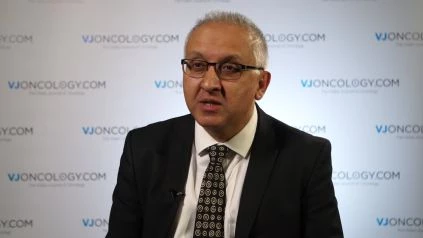Mansoor Mirza, MD of Rigshospitalet, Copenhagen University Hospital, Copenhagen, Denmark gives an overview of the ENGOT-OV16/NOVA Phase III trial of maintenance with PARP-inhibitor niraparib versus placebo in patients with platinum-sensitive ovarian cancer (NCT01847274). Dr Mirza explains that the hypothesis of the trial was that all patients with platinum-sensitive disease will benefit from niraparib. Patients with platinum-sensitive disease, who progressed and then received six courses of combination chemotherapy, were invited to take part in the trial at the end of that chemotherapy when they were responding. The did a centrally performed germline BRCA (gBRCA) status and separated the patients into two cohorts: gBRCA mutated patients and non-gBRCA mutated. Patients were then randomized to receive niraparib or placebo until progression and progression-free survival (PFS) was the primary efficacy endpoints. There were three efficacy endpoints: gBRCA mutated cohort, non-gBRCA mutated cohort and within this cohort, a homologous recombination deficiency (HRD) test was performed to further divide patients into HRD postive and negative groups.
Recorded at the 2016 annual meeting of the European Society of Medical Oncology (ESMO), held in Copenhagen, Denmark.
Trial design of ENGOT-OV16/NOVA Phase III trial of niraparib in platinum-sensitive ovarian cancer

